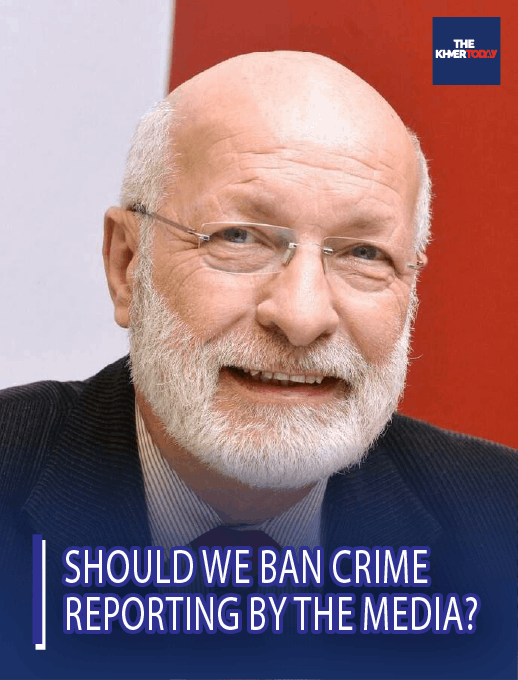OPINION: Should We Ban Crime Reporting By The Media?

Phnom Penh, October 05, 2023 --
Recently, an eminent personality proposed that social networks and the media stop broadcasting images and reports on crimes committed. In a democracy, such proposal opens a very important debate. Because several fundamental questions are at stake: the values that circulate in society and the legacy of the recent past, the reality of violence, the responses to be made, the role of the media and social networks.
There is no doubt that violence is very present in Cambodian society, and it manifests itself through criminal behavior. No one can deny this.
Cambodian society today continues to be a victim of the horrors caused by the 1970-1975 war and the massive bombings and by the Pol Pot regime. It is from this perspective that we must approach the issue of violence and the crimes it generates. And this is no surprise to anyone who has studied genocides (Armenia, European Jews, Cambodia, Rwanda, former Yugoslavia, etc.) and their consequences. It is established that the trauma suffered by survivors is passed on in one way or another to their children. We don't move towards tomorrow by forgetting yesterday: most of the acts of violence can be explained by a recent and painful past.
But, the causes of violence are not only born from the trauma of the horrors of the 1970s. The past, even if it weighs heavily, does not provide the only explanation for the violence that reigns today. There are at least two other explanations.
The first is at the heart of a conflict within Cambodian society. On the one hand, there are the traditional values of Khmer society which are characterized by respect for the family, duties towards elders, politeness, and respect for others in social relationships. On the other hand, there are behaviors born from new aspirations for an individualistic way of life, based on money and power. It generates selfish and violent behavior. It destroys families and weakens social cohesion. Those who behave like this no longer care about the fate of others. Worse, they have become a danger to others.
The second explanation is to be found in the feeling of injustice caused by the spectacle of social inequalities. A society cannot experience genuine peace when it presents the spectacle of strong social disparities. A lesson from the past that should never be forgotten is that communism was born in Cambodia from the extreme gap between the wealth of the cities and the poverty of the countryside. Today that communism has shown its horrible face, it is no longer a political choice. All that remains for the desperate is violence.
The question facing Cambodian society, its elites, those who govern it, parents and teachers, the media and those who exercise influence over others is: how to reduce violence?
Ignoring violence is the worst mistake to make. We must recognize the existence of criminal violence and address its causes.
Dealing with violence and crime requires a strong commitment from the entire society, that is to say from parents who must never tolerate it from their children, from schools which must teach students that life is the most precious good and that all conflicts can be resolved by non-violent means, from authorities who must severely repress all crimes committed regardless of their perpetrator, but who must also disseminate a culture of peace, like Samdech Hun Sen had already proposed in 1995. Mobilizing the media and social networks to make people understand the need to resolve all conflicts peacefully is one response to criminal violence.
The education system, the media and advertising agencies have a huge responsibility when it comes to disseminating values. Exalting wealth, luxury and power can only create expectations that are rarely met and therefore serious frustrations leading to tensions and criminal behavior. Highlighting solidarity between generations, respect for others, and the value of a job well done can, on the contrary, strengthen social cohesion and a peaceful society.
The fight against poverty and the improvement of the standard of living of the poorest people is a way of reducing the violent rejection of inequalities. And our new Prime Minister is right to make it one of his government's priorities.
There is a very strange contradiction between asking not to broadcast images of crimes committed and at the same time tolerating the waves of violence that we can see in fictions broadcast on cinema and television screens. This problem is also a matter for debate.
The media must not ignore violence. They must show the scourge it represents in our society. But this is not enough. With the help of the authorities, the media must show how this violence is treated and repressed.
The media also bears a responsibility in education of the people. They must help families to train young people in respect for others and the refusal of all forms of violence. But they must also relay what the authorities are doing to suppress crime. It is not enough to say that "investigations are ongoing". We must show that “le crime ne paie pas” (French expression to say that crime does not give you any advantage, because you will be caught and punished), and that Justice is doing its job.
Denying violence is not the solution to decrease violence. It is not by silencing the messenger that we suppress the content of the message. We must recognize the existence of criminal violence and address its causes.